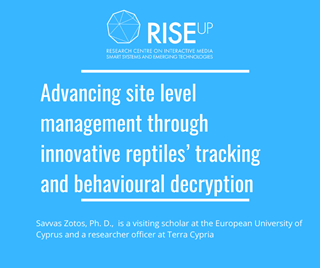13 February. 2020 | 10:00 | Julia House, 21612, CY1591, Themistokli Dervi 3, Nicosia 1066

Advancing site level management through innovative reptiles’ tracking and behavioural decryption
Invited Talk - 13 February, 10:00-11:00, Julia House
Although modern technologies such as GPS and accelerometers have revolutionized the field of animal monitoring and habitat utilization, there have been technical limitations preventing their use for small-sized reptiles. Through the project “ReTrack” we aim to overcome those limitations by developing innovative monitoring techniques/approaches that will allow continuous monitoring and pinpoint locating of small reptiles along with post-process recognition of their behaviour. These innovations will in turn advance scientific knowledge in the fields of reptile locomotion, behavioural analysis and conservation.
For achieving our aims, we are working in parallel with two equally significant pillars, (a) remote tracking and (b) behaviour analysis, testing the response of our techniques in two common reptile species, a lizard (Stellagama stellio) and a snake (Dolichophis jugularis).
In the first pillar (remote tracking) we are developing a system able to continuously track small VHF transmitters attached on reptiles, obtain fine-scale locomotion data and project them on a digital map. This technique is based on Angle-of-Arrival measurements acquired through Radio Direction Finding (RDF) technology.
In the second pillar (behavioural analysis) we are using small-size accelerometers (recording at 100Hz) attached on reptiles’ dorsal scales to obtain insides on animals’ 3-axis movement. By combining these data with videos from moving animals we are developing behavioural pattern databases able to be used with pattern recognition software (DDMT) for autonomously recognizing movements and/or behaviours.
The above techniques will be able to advance site level management of protected reptile species through the development of fine-scale micro-habitat utilization maps, which in turn will allow the designing of more targeted, species-based management and conservation actions.
On the sidelines of the project, a new initiative has arisen for developing Cyprus Virtual Biodiversity Museum. Using digital photogrammetry, accurate, full-colour 3D models of small reptiles have been developed, while the movements of the animals are been recorded by using motion capture system (OptiTrack – Motive). Cyprus Virtual Biodiversity Museum will offer a unique educational experience through an online platform, holographic pyramids and an augmented reality app where the general public will have the opportunity to interact with digital animals, observing their morphology, movements and behaviours.

Short Bio
Savvas Zotos is a visiting scholar at the European University of Cyprus and a researcher officer at Terra Cypria – the Cyprus Conservation Foundation, conducting his Post-Doctoral Research on reptiles’ locomotion and behaviour. He holds a B.Sc. (2004) and Ph.D. (2014) in Biology (National and Kapodistrian University of Athens) and has been awarded a scholarship for Doctoral (PENEK) and Post-Doctoral Research (DIDACTOR) by the Cyprus Research and Innovation Foundation. His main research interests are in Animal Ecology, Behaviour and Conservation with special focus on reptiles.
Before joining Terra Cypria, he served as a researcher/herpetologist at the Department of Agricultural Sciences, Biotechnology and Food Science, Cyprus University of Technology (2016-2017), Terrestrial Ecosystems Management Lab, Open University of Cyprus (2014-2016), Nature Conservation Unit, Frederick University (2009-2014). He also collaborated and offered his scientific expertise on monitoring and conservation of flora and fauna to several public authorities including the Department of Environment, the Department of Forest, the Department of Fisheries and Marine Research and Game and Fauna Service.
During the years he offered his scientific expertise as a member of the board in a number of environmental Non-Government Organizations (i.e. Cyprus Herpetological Society, Cyprus Federation of Environmental and Ecological Organizations, Friends of the Earth Cyprus) and is the scientific advisor for the development of Cyprus Reptile Park that Cyprus Herpetological Society is constructing at Neo Chorio, Pafos. He is also one of the principal investigators behind the creation of the Cyprus RoadKill Observation System, a citizen science approach that aims to report and analyse the impact of Cyprus Road Network on wild animals.
Thus far he has participated in numerus EU funded projects (LIFE, COST, Erasmus), assisting project management, providing scientific expertise and conducting research on animal monitoring and conservation. He has participated and presented his research work in various international scientific conferences concerning zoology, herpetology and animal conservation